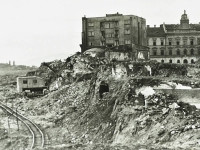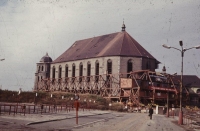It was possible to walk through the festival of political song with an underground band
Download image
Luděk del Maschio was born on 21 March 1962 in Děčín. He owes his surname to his family roots in Italy and Croatia. After his parents divorced, Luděk moved to Most with his mother and brother when he was five years old. Luděk del Maschio grew up in the backdrop of a city that was gradually disappearing and giving way to the mining industry. He witnessed the relocation of the Church of the Assumption, which had to be cut down and moved to the railroad tracks because of mining. The semi-dilapidated buildings and courtyards were later the venue for art exhibitions and happenings - Luděk encountered the work of Jiri Sozansky here as a teenager, and since he had been attending painting and drawing classes at the Folk Art School since he was 14, it was logical that his next steps in his studies would be directed here. Despite the fact that after primary school he got into the renowned Václav Hollar Secondary School of Art, for family reasons he entered the Most Mechanical Engineering School. After graduating in 1981, he longed to study painting, but the regime would not allow him to study art. Only the intervention of his teacher from the folk art school helped. Luděk del Maschio enrolled at the University of Applied Arts in Prague. After a few initial hours of study, he was transferred to a branch in what was then Gottwaldov - the Department of Shaping Machines and Tools, where Luděk met Marek Pražák, Josef Sládek and Tomáš Chorý, who together founded the underground band Svoz řepy. This formation, which used dark visual effects and lyrics accompanied by music with a touch of new wave and industrial, won the district round of the Festival of Political Song in 1988. Svoz řepy performed with such legends of Czechoslovak alternative music as Mikoláš Chadima’s MCH Band. The Velvet Revolution found Luďek del Maschio in the premises of the Uherské Hradiště prison, where he participated as an artist in the painting of the backdrops for the upcoming film Jen o rodinných záležitostech (Only About Family Matters), which reflects the political processes of the 1950s. After the fall of communism, Luděk del Maschio embarked on a journey as a freelance artist, but he also worked in design. At the time of the interview in 2024, he was living with his wife Simona in Zlín.

